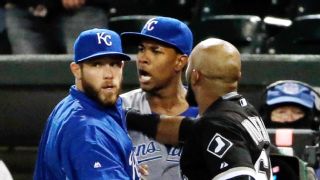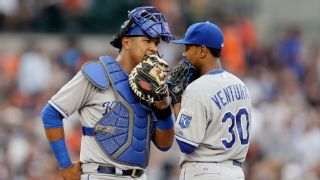|
KANSAS CITY, Mo. -- There's a man in the Dominican Republic who believes he knows what's going on in Yordano Ventura's brain. If he's right, he may be the smartest person in baseball. For years, Kansas City's coaches have been trying to figure the young flamethrower out. They have seen Ventura so locked in that he dazzles in Game 6 of the 2014 World Series, just two days after a friend's death. They have watched him spin so out of control that he comes unglued in a routine game the next spring when a hitter looks at him funny. Ventura's emotions can turn almost as quickly as his 100-mph fastballs. So can his fate. On Opening Day, Ventura, now 24, had a freshly inked $23-million contract and a dream job as Kansas City's ace. By late July, with his fastball and confidence getting tattooed, he was called into Royals skipper Ned Yost's office and told he was being sent down to the minor leagues. Three months later, after Kansas City sacrificed three left-handed pitchers to acquire Johnny Cueto to be its ace, Ventura - not Cueto -- will start in Game One on Thursday in the ALDS. In between those momentous days, Ventura picked a fight with reigning MVP Mike Trout, started a bench-clearing brawl in Chicago, beaned Oakland's Brett Lawrie, served a seven-game suspension and got everyone asking, "What is he thinking?" "Here's this kid," says Royals backup catcher Drew Butera, who was with the Angels this spring during the Trout dustup, "he's got electric stuff, and he's throwing a shutout against us, and the moment he gives up a run, it's like we did something to his family." That's where Victor Baez comes in. Baez, the field coordinator for the Royals' academy in the Domincan Republic, is like a father to Ventura. He was there seven years ago when a scout brought Ventura to the academy, when Ventura was so scrawny Baez thought he was a little boy, not a 17-year-old with a 91-mph fastball. Baez insists Ventura is not a punk. He's just misunderstood. In Ventura's mind, he is still that 5-foot-6, 120-pound teenager alone on a baseball field, trying to get noticed. Back in the D.R., he was always doing things that tested Baez's patience, things to compensate for his size. He wanted to throw 100 mph in batting practice. He was passed over so many times that even now that he's made it, he's still constantly trying to prove himself. That's why he stared down the 6-foot-2, 230-pound Trout, an impressive physical specimen who could've destroyed Ventura (now 5-11, 180) like one of his Subway sandwiches. Ventura, Baez says, has the money and the job now, but somewhere in that head beneath the slightly tilted ballcap, he believes he still doesn't have the respect. "It's because he's a small guy from the Dominican," Baez says. "All his life, he feels he needs to earn his place on the team. In the Dominican, teams see him and nobody signs him because of his body. "He is fighting for everything. He's fighting for his life."  VENTURA NEVER MADE it to Triple-A Omaha in July. Just as he was finalizing plans for the three-hour drive up Interstate 29, Royals pitcher Jason Vargas tore a ligament in his elbow, leaving a hole in the rotation. Still, the demotion had a significant impact. Before that late-July meeting in Yost's office, he had a 4-7 record and a 5.19 ERA. Since then, he has gone 9-1 with a 3.03 ERA, 91 strikeouts and zero outbursts. He struck out 11 on Saturday at Minnesota, tying a career high, and carried a no-hitter into the fifth inning. He was equally impressive the week before against the Cubs, tossing five perfect innings. "He's got his confidence back," Royals pitching coach Dave Eiland says. "He's keeping it simple when he pitches." When the Royals called Baez back in July to tell him Ventura was being sent to the minors, he worried about how his young protégé would handle it. But Ventura was uncharacteristically calm. He told Baez that he knew he needed to make a change. One night earlier, he'd been rocked for six runs against Pittsburgh and had hung numerous pitches over the plate. "He sounded like a different kid to me," Baez says. "He was ready to go to Triple-A. He wasn't mad at all, and that was surprising. That meeting changed him." Ventura expressed just one concern in his conversation with Baez: He didn't want the coaches and front office to think he couldn't compete at a major league level. The comment surprised Baez: after all, Ventura didn't just prove he could compete in 2014; he established himself as one of the brightest young pitchers in baseball. He struck out 159 batters as a rookie, carried a 3.20 ERA and was by far the most consistent man in the Royals' rotation as they made a surprise run to the World Series. But then veteran ace James Shields left for San Diego in the offseason, and Ventura became the new No. 1 pitcher. He was no longer The Kid. At 23, he was The Man. Several Royals wonder if Ventura put too much pressure on himself in the first half of the season. Catcher Salvador Perez says Ventura "wanted to do too much." The ace was pressing enough in June that first baseman Eric Hosmer pulled him aside for a talking-to in the dugout after Ventura was yanked after three innings and was acting pouty. "How can you not feel pressure when you're a young kid and you earn a big contract and get a lot of money?" Hosmer says. "There's people who are counting on you to be good, and he was the Opening Day guy, so that's a lot of pressure. He's really emotional about the game, and he wanted to do everything he can to go out and be the ace for this team, and it didn't happen. So it's frustrating. He learned from that." Ventura's mercurial emotions are his biggest problem but also his biggest asset. The best example of his ability to control his passion came last fall. The Royals were heading home from San Francisco after Game 5 of the World Series, a loss that put them in a 3-2 hole. Ventura had just learned Oscar Taveras, an outfielder for the St. Louis Cardinals and a friend from the Dominican Republic, had died in a car accident. Ventura was overcome with sadness, and nobody knew how he'd handle a looming Game 6 start. But then Ventura walked up to Eiland and Rene Francisco, the Royals' assistant general manager, on the plane. "I got this," he said. "I'm going to show people." He scrawled Taveras' initials on his cap, then took the mound and surrendered just three hits in a 10-0 Royals blowout, giving Kansas City one more night of celebration before the Giants captured the title in Game 7. But when things went bad this spring, Ventura started thinking too much. After the beaning incidents, Eiland says, Ventura was afraid to pitch inside for fear of hitting someone, starting another fight and letting down his teammates. "He was a little bit embarrassed by his actions," Eiland says. "It was a learning process. I said it back then and I'll say it again now: He's going to be better because of that. He learned a lot of stuff about how to be a big league pitcher, what to do and what not to do, and that line that you don't cross."  VENTURA WAS "THE MAN" once before. When he was 14, he dropped out of school to work construction and help take care of his mother, who was raising him on her own. Three years later, he got a break: a scout spotted him and brought him to Baez. Accounts vary on how big Ventura was when he arrived at the Royals' academy. Most reports say he was 120 pounds; Rene Francisco says it was more like 135. Either way, Ventura was small enough that from a distance, Baez thought he was a child. But then Ventura started unleashing 90-mph pitches, and the club signed him for $28,000. Ventura was required to live at the academy for a year and a half, because the Royals feared he might hurt his arm trying to throw too hard unless he was under constant supervision. They also believed he needed direction, because he hadn't had a lot of male role models in his life. He is a once-in-a-hundred-years prospect, Baez says: gifts like Ventura's aren't supposed to come in such small packages. His body reminded them of Pedro Martinez, another feisty pitcher from the Dominican who shrugged off doubts about his size and stamina and was recently inducted into the Hall of Fame. Ventura idolized Martinez. Besides his arm, Ventura's other most striking feature was his competitive fire. Baez had to kick him out of the academy a couple of times for doing the things he did in Kansas City earlier this spring -- staring down hitters, losing control. "He's not a bad kid at all," Baez says. "But sometimes he has too much energy in his body and his head. That puts him in trouble." Baez says Ventura's personality can be hard to figure out because he's quiet and keeps to himself. In Kansas City, he mingles mostly with the Spanish-speaking guys, and when he does interviews, he uses an interpreter. His English skills are good; he just doesn't feel comfortable being interviewed in English because something he says might come out wrong. Ventura's turnaround wasn't as simple as Baez telling him to calm down. It took Eiland convincing him to stop overthrowing his fastball and to trust his secondary pitches (Ventura's curveball was virtually unhittable against the Twins on Saturday). It took the soothing leadership of Perez, an All-Star catcher who knows just how to talk to each of his pitchers. It took the support of Francisco, who was planning to drive Ventura to Omaha just to be there for him. Cueto and Edinson Volquez helped, too. They're both veteran pitchers from the Dominican Republic, and they understand him. Volquez sees so much of himself in Ventura: the youthful energy, the short fuse. Volquez was lucky. He made most of his mistakes in the minor leagues, where few noticed. When the Royals acquired Cueto just before the trade deadline, some worried about the potential for animosity with Ventura, because Cueto was essentially brought in to take over as the team's ace. Instead, the pitchers bonded quickly and are often seen standing next to each other in the dugout. "I think Johnny Cueto helped him a lot when he came to the team," Baez says. "Yordano told me, 'I work hard with him every day.'"  IT IS THE AFTERNOON after the Royals clinched their first division title in three decades, and candles, aerosol spray and a large fan are working in unison to try to combat the stench of day-old champagne in the clubhouse. A plastic owl is sporting a headband and a cigar. Everyone is loose and happy as a group of young men in suits -- visiting members of the Royals' farm system -- awkwardly walk around in the clubhouse. Ventura sticks his hand out and says hello to the youngsters. Ventura calls the first part of the season "a delicate time." Of course he cared what people thought of him. He wanted to so badly to repay his team's trust him in him, to show he was worthy of everything he'd been given. He finally learned to let go of all that stress and has an ease about him that hasn't been seen since last October. "I am simply trying to control what I can," Ventura says in Spanish. "Thank God I came back and people have seen the change, and that's what's important, that the fans notice and the players of the other teams, as well as ours." After being traded from the Angels to the Royals in May, Butera has enjoyed getting to know Ventura as a teammate instead of a villain. He understands the pitcher's competitiveness and passion now. He doesn't want him to lose it. Much has changed since Opening Day. Three of the Royals' starting pitchers in April are gone from the rotation -- Vargas is out for the season, and Danny Duffy and Jeremy Guthrie have been relegated to the bullpen. Even Cueto was shaky for about a month as he adjusted to a new catcher. So the Royals know that if they are going to make another deep postseason run, they'll have to do it on Ventura's shoulders. They'll need him to be the kid he was in 2014 -- and the man he is now.
|

